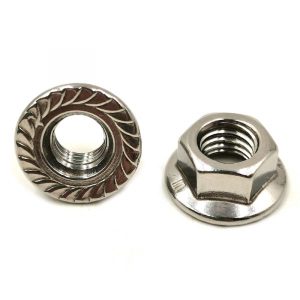In the world of mechanical fastening, securing components in a precise and reliable manner is paramount. The introduction of nuts with integrated teeth marks a significant advancement in fastening technology, offering unparalleled grip and durability. This article delves into the specifics of these innovative fasteners, providing a comprehensive overview of their design, benefits, and applications.
Innovative Design
Material Composition
Manufacturers craft nuts with integrated teeth from high-grade steel, ensuring a blend of strength and resilience. The choice of material is crucial, as it directly impacts the nut's quality and performance. The steel undergoes a thorough heat treatment process, enhancing its tensile strength and resistance to wear. These nuts boast a hardness level that can withstand extreme pressure and temperature variations, making them suitable for use in harsh environments.
Geometric Precision
The defining feature of these nuts is their precision-engineered teeth, which are integral to the nut's design. Each tooth is meticulously shaped to maximize contact with the mating surface, thereby increasing friction and preventing slippage. This design not only improves the fastener's grip but also distributes the load more evenly across the contact area, reducing the risk of material deformation.
Performance Metrics
Enhanced Grip Strength
The grip strength of nuts with integrated teeth is significantly higher than that of standard nuts. This is due to the interlocking teeth, which dig into the contact surface, creating a secure mechanical bond. Tests show that these nuts can maintain their grip even under vibrational stress, making them ideal for applications in automotive and aerospace industries.
Longevity and Durability
Durability is a key advantage of these nuts. The combination of high-quality material and innovative design results in a fastener that can endure repeated use without significant wear. This longevity translates into cost savings, as the need for frequent replacements diminishes.
Specifications and Parameters
Manufacturers offer these nuts in various sizes and specifications to accommodate a broad range of applications. The dimensions range from M2 to M20, catering to both small-scale and heavy-duty fastening needs. The load capacity of these nuts varies according to size and design but generally exceeds that of conventional nuts by a considerable margin.

Applications and Advantages
Versatile Use Cases
Nuts with integrated teeth find application across numerous sectors, including automotive, construction, and renewable energy. Their ability to maintain a tight grip under dynamic conditions makes them particularly suited for securing components in moving machinery and vehicles.
Economic Benefits
In terms of cost, these nuts represent a highly efficient solution. While the initial purchase price may be higher than that of standard nuts, the extended lifespan and reduced maintenance requirements result in a lower total cost of ownership. Moreover, the enhanced reliability of these fasteners can prevent costly downtime and repairs, further contributing to their economic advantage.
Conclusion
Nuts with integrated teeth offer a revolutionary solution to the challenges of mechanical fastening. Their superior grip, durability, and versatility make them a valuable asset in any application where reliability and performance are critical. By choosing these advanced fasteners, engineers and manufacturers can achieve a higher level of precision and efficiency in their projects.
